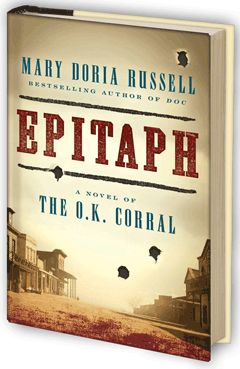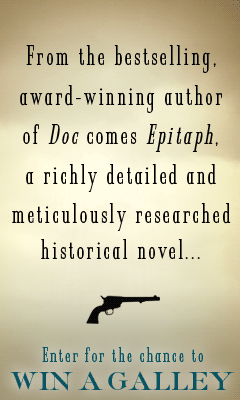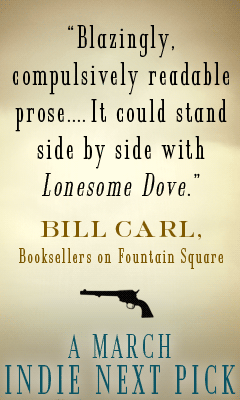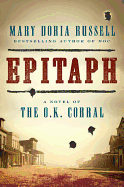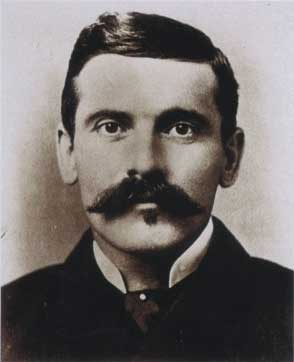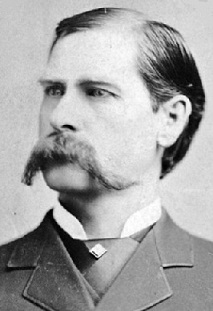Epitaph: A Novel of the O.K. Corral
by Mary Doria Russell
The motto of the Tombstone newspaper the Epitaph read "Every Tombstone needs an Epitaph," and Mary Doria Russell (The Sparrow, Children of God) has set out to provide one. Having written about the life of Dr. John Henry "Doc" Holliday (in Doc), Russell takes the logical next step with a sweeping yet personal recounting of the human egos and social clashes that swirled into an infamous storm of gunfire in 1881 Arizona. Before the romance of the Old West entered our national consciousness, before the world at large ever heard the name O.K. Corral, Wyatt Earp was just one of a passel of Earp brothers who came to the silver strike town of Tombstone in hopes of capitalizing on its quick economic growth. Russell takes readers through the turbulent months leading up to a 30-second shootout that would divide a nation, as seen through the eyes of the men--not yet heroes or villains--and women who shaped the events.
Readers' natural reactions may be to assume that Russell cannot give them a better or different story than the films Tombstone and Wyatt Earp, in which the honorable Earp brothers and Doc Holliday defeat the cattle-rustling Cowboys gang in a showdown that symbolizes the civilized farmer-landowner conquering the lawlessness of the Wild West. However, Russell's unique treatment of the material provides a more detailed and human look at some of the most lionized and reviled personalities in U.S. history without regard for their legendary status. Since the O.K. Corral shootout stands as one of the formative mythologies of American culture, Russell fittingly frames the story in terms of a Homeric poem. Every Iliad begins with its Helen, and this one is no exception. Josephine Sarah Marcus, a runaway teenage girl from San Francisco, may seem more deserving of a supporting role in a story traditionally told from a male perspective, but Russell returns frequently to the wide-eyed ingénue who would later have an enormous influence on the public understanding of Wyatt Earp. Josie's early days in Tombstone as the live-in lover of Sheriff Johnny Behan give readers a newcomer's view of Tombstone and its citizens, allowing Russell a jumping-off point into the lives of Behan, Holliday and the Earps, who in turn provide entry into the lives of other characters, emphasizing the small-town interconnectedness of their orbits.
Readers will find no good guys in white hats here. While the side of the Earps and Holliday is more sympathetically drawn, Russell spends plenty of time sketching the opposition as well, particularly Ike Clanton, whose brain is slightly addled from the many times he has taken a beating his father meant for one of his younger siblings. Easiest to like is Tom McLaury, who believes he has found the love of his life in Morgan Earp's faithful common-law wife, Louisa, and tries to court her with plants that will bloom in the desert. Figures who affected or were affected by the situation but are generally given little exploration in retellings have center stage moments, from newspaper editors to stagecoach drivers, and especially the Earps' domestic partners. Giving consideration to the backstories of people traditionally cast as villains or ignored completely allows Russell to set up a panoramic view of "a time of fakery and exuberant corruption, of patronage and cronyism and every species of shameless self-seeking." Her triumph lies not only in a gripping reimagining of the events leading up to the famous gunfight, but in her dissection of how Wyatt's name became the focus of political and ideological pressures that hardened his legend from coal to diamond.
"It wasn't lying. It was letting a lucrative legend replace an old man's life." The arguing starts as soon as the smoke of the shots clears from the air. In a deeply divided partisan climate, the Earps and Holliday become symbols of law and order for a Democratic party that supports fencing the range and the rights of landowners, while the Cowboys became symbols of persecution to a Republican party that "resists regulation in the name of personal liberty." Even today, historians cannot say what happened during the gunfight with any certainty--who shot first, who was or was not armed--in part because so many conflicting eyewitness accounts muddy the waters. Russell's point, however, is not who fired at whom, but the ways in which a single violent moment defined a man's life forever.
Western genre fans may seem like the obvious audience for anything Earp-related, and certainly Russell packs in enough action and gun-slinging to satisfy them. However, her broad portrait of a time combined with her detailed depictions of its people will enthrall anyone who likes their thrills with a side of thoughtfulness or wants to pull back the veil on whitewashed versions of actual events. While filled with romance and danger, this account also embraces the bittersweet nature of real life and celebrates the humanity of some of our most lauded heroes, their heads made only heavier by the laurels. --Jaclyn Fulwood



